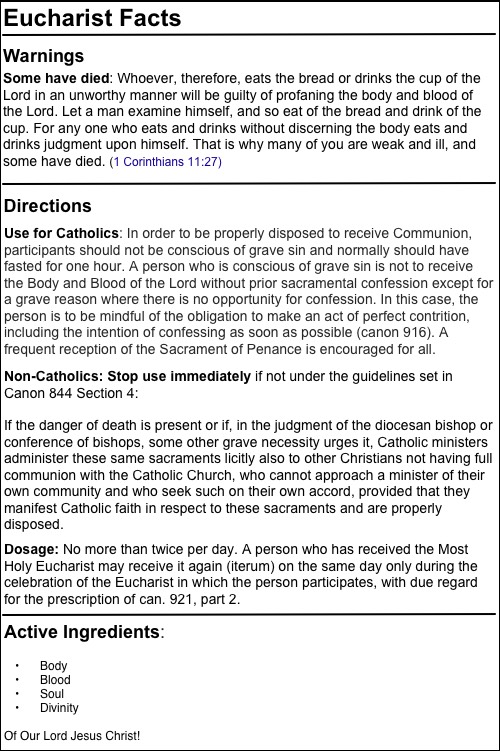There has been a lot of virtual ink spilt over this one footnote in the Apostolic Exhortation Amoris Laetitia.
I would also point out that the Eucharist “is not a prize for the perfect, but a powerful medicine and nourishment for the weak”
This little footnote has become like a Rorschach test for Catholics who see what they want to see in it.
Still while the concept of the Eucharist as medicine is nothing new, it did get me thinking about all those medicine commercials with a list of side effects half the length of the commercial. So I came up with this:

Previously posted by Ed Peters.
Some seem upset that I agreed with Pope Francis that the Eucharist is “powerful medicine” for sinners, a figure of speech the pope used in Amoris laetitiae fn. 351 (see also his Evangelii gaudium 47). May I suggest that those objecting to the pope’s phrasing, and my agreement with it, need to familiarize themselves better with the Church’s rich understanding of the Eucharist. Doing so will, I think, enable them not only to see what is profoundly right about the pope’s choice of words, but help them to articulate what is profoundly missing from it.
The bounteous effects of the Eucharist, specifically in regard to forgiveness of and preservation from sin, are laid out in the Catechism of the Catholic Church 1393-1395, 1436, and 1846. These passages amply support the pope’s phrasing in fn 351. But missing from the pope’s commentary here is an acknowledgement that, as is true of a “powerful medicine”, taking the Eucharist improperly can be harmful, even spiritually deadly, to the recipient.
I don’t expect a footnote to contain every nuance of Church teaching or else a footnote would become another document with it’s own footnotes and on and one. So my prescription is to drink a glass of water and just read Church documents with the mind of the Church.

1 comment
Don’t forget the two aspirins.